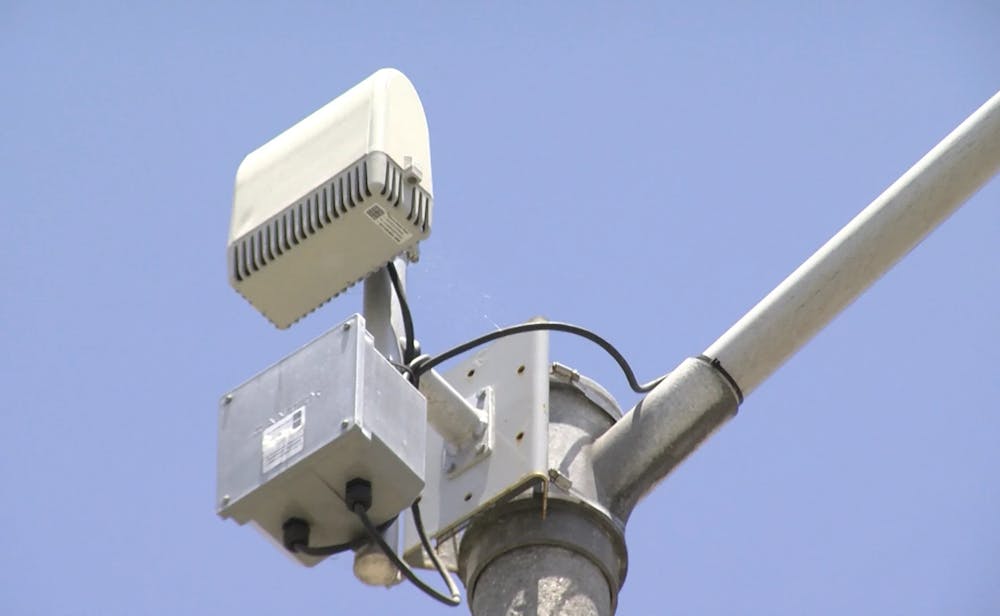In a new effort to curb gun violence, Durham City Council approved room in the 2022-23 budget for ShotSpotter, an automatic gunfire detection technology.
A majority of the City Council voted in March to move forward with a budget that would allocate $197,500 for a ShotSpotter pilot program in the 2022-23 fiscal year. The first three months of the pilot will be funded by the company, and the budget allocation will cover the cost of the remaining nine months, according to Durham Mayor Pro Tempore Mark-Anthony Middleton.
ShotSpotter uses microphones placed in public areas. Once the software picks up on a noise it classifies as gunfire, police are automatically alerted and dispatched to the area where the noise was detected.
“When I first proposed ShotSpotter, some years ago, it really had nothing to do with violent crime, per se, or catching bad guys or getting shell casings. It really had to do with saving lives,” Middleton said.
The technology has been implemented in several cities but remains controversial. In Chicago, one city where ShotSpotter is being used, a study conducted by Northwestern University’s MacArthur Justice Center found that 86% of ShotSpotter alerts did not result in police reports of crime. The study claimed that ShotSpotter “sends police on thousands of unfounded and high-intensity deployments, which are focused almost exclusively in Black and Latinx communities.” The highly publicized fatal shooting of 13 year old Adam Toledo by the Chicago Police Department stemmed from a ShotSpotter alert.
Durham Beyond Policing, a local advocacy group focused on divesting from police and prisons, filed a petition calling on the city to reject ShotSpotter. The petition is no longer available for public viewing, but a DBP Facebook post publicizing the petition read, “Our communities deserve real evidence-based solutions, not this waste of our precious public dollars.” The post cited youth programs, universal basic income and eviction diversion as some examples of what the city should fund instead of ShotSpotter.
When asked about DBP’s petition, Middleton said that there are “some in this debate discussion, who, because of their adherence to the defund philosophy … anything that's viewed as augmenting or increasing the capabilities of the police is a non-starter.”
DBP did not respond to a request for comment by The Chronicle.
At a March 21 City Council public hearing, DBP’s concerns were echoed by several Durham residents.
Danette Wilkins, a program officer for Breakthrough ACTION at Johns Hopkins University, cited evidence against ShotSpotter’s effectiveness, including the Northwestern data. She also pointed to the Chicago Inspector General’s finding that the technology has affected some police members’ behavior in areas where ShotSpotter alerts are frequent.
“At least some officers, at least some of the time, are relying on ShotSpotter results in the aggregate to provide an additional rationale to initiate stop or to conduct a pat down once a stop has been initiated,” according to the Inspector General’s report.
Wilkins asked the City Council to consider the evidence against ShotSpotter, including the fact that Charlotte decided not to renew their annual ShotSpotter contract due to questions about efficacy. Instead, Wilkins called for more “evidence-based solutions for gun violence in dialogue with those Durham community residents who are more directly impacted by gun violence.”
Brittany Price, who identified herself as a public health professional, began, “Like all of you, I want our neighbors to live abundant, flourishing lives.” But she believes that the ShotSpotter pilot will not advance that goal. Price said that the available research shows that ShotSpotter is not preventing gun violence or impacting health outcomes for people who have been shot. She raised the point that interaction with law enforcement leads to poor health outcomes for marginalized and criminalized groups.
Price said that research shows worse mental health outcomes for Black Americans who have had contact with the police. She also said that over-policing—to which ShotSpotter would contribute—is linked to worse overdose rates for those with drug addictions. Additionally, she pointed to evidence showing that young people who have been stopped by police report these experiences as “traumatic and stigmatizing.”
In response to these concerns, Middleton said that human beings are also prone to mistaking other sounds for gunfire, and described the statistical success rate of the technology as “incredibly high and incredibly accurate.” A ShotSpotter report claims that in 2019, the system had a 97% aggregate accuracy rate.
Middleton also pointed out that Durham residents, many of whom are low-income and living in neighborhoods experiencing gun violence, are the ones who have asked the City Council to consider implementing the technology.
The vote was not final, and the budget is now in the public comment period. The second and final hearing is scheduled for June 6, and the final budget is to be approved on June 21.
Get The Chronicle straight to your inbox
Signup for our weekly newsletter. Cancel at any time.
Anisha Reddy is a Trinity junior and a senior editor of The Chronicle's 118th volume.

